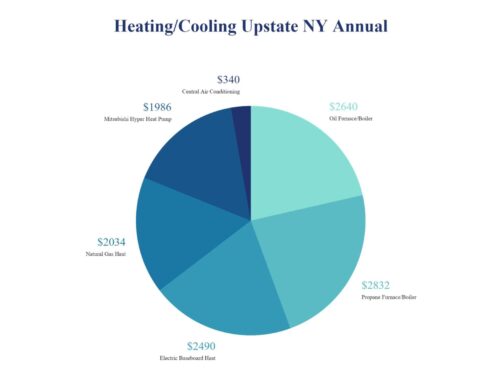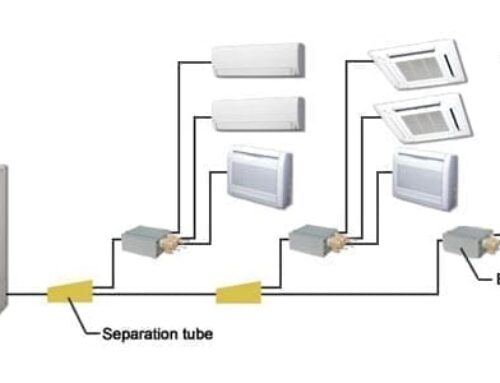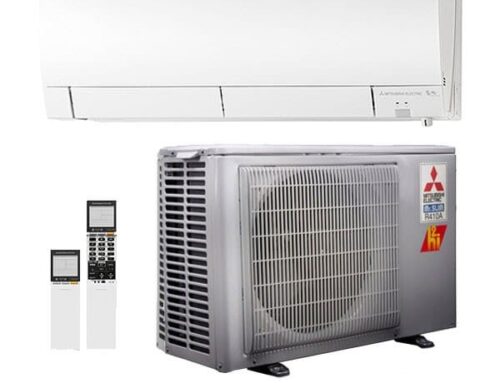
Comprehensive Guide to Mitsubishi Mini Splits
Introduction to Mitsubishi Mini Split Systems
Mitsubishi is recognized as a leading HVAC manufacturer globally, offering an array of ductless heating and cooling solutions. The Mitsubishi Mini Split System stands out as a premier example of a ductless system, designed to enhance the comfort of residential spaces without the need for extensive ductwork. These systems are particularly advantageous for homeowners looking to improve energy efficiency and indoor air quality while maintaining a quiet and comfortable living environment.
History of Mitsubishi HVAC Systems
Mitsubishi has a long history of innovation in the HVAC industry, dating back to its founding in 1921. Over the decades, the company has developed a reputation for producing high-quality, reliable, and efficient heating and cooling systems. The introduction of the mini split system marked a significant advancement in HVAC technology, providing a flexible and energy-efficient alternative to traditional central air conditioning systems.
What Are Mini Split Systems?
Mini split systems, also known as ductless air conditioners, consist of an outdoor compressor unit and one or more indoor air-handling units. These systems are called “mini splits” because they split the components of a traditional air conditioning system into two separate units. This design allows for more precise control over the temperature in different areas of a home, making them an ideal solution for both new constructions and retrofits in existing buildings.
Key Components of Mitsubishi Mini Splits
Indoor Unit
- Function: The indoor unit houses the fan and evaporator coil, delivering conditioned air directly to the room. It is designed to be compact and unobtrusive, blending seamlessly with the interior decor. Mitsubishi offers various styles of indoor units, including wall-mounted, floor-mounted, and ceiling cassette models, each catering to different installation preferences and aesthetic requirements.
- Technology: Mitsubishi’s indoor units are equipped with advanced technology such as i-see Sensor™, which detects temperature variations within a room and adjusts airflow accordingly, ensuring consistent comfort throughout the space.
Outdoor Unit
- Location: The outdoor unit, installed outside the home, contains the critical compressor and condenser components. It is engineered to withstand various weather conditions, ensuring reliable performance year-round. Mitsubishi’s outdoor units are also designed for quiet operation, minimizing noise disturbance for both the homeowner and neighbors.
- Efficiency: Mitsubishi’s outdoor units use inverter technology, which allows the compressor to adjust its speed based on the cooling or heating demand. This leads to significant energy savings and more consistent indoor temperatures compared to traditional fixed-speed compressors.
The two units are connected by a minimal set of lines, including power, refrigerant, and a condensation drain, requiring just a small wall penetration for installation. This design minimizes the need for extensive ductwork, making installation quicker and less invasive.
Advantages of Choosing Mitsubishi Mini Splits
Mitsubishi Mini Splits are celebrated for their energy efficiency, minimal operational noise, and flexible temperature zoning capabilities. These systems offer:
Energy Efficiency
- Zoned Comfort: Mitsubishi mini splits allow for individual temperature control in different rooms, leading to enhanced comfort and reduced energy consumption. By only heating or cooling the rooms that are in use, homeowners can achieve significant energy savings.
- Inverter Technology: The inverter-driven compressors adjust their speed to match the cooling or heating demand, ensuring optimal energy use. This results in lower energy bills and a smaller carbon footprint.
Quiet Operation
- Low Noise Levels: Mitsubishi mini splits are engineered to operate quietly, ensuring a peaceful home environment. The indoor units produce minimal noise, making them ideal for bedrooms, living rooms, and other areas where quiet operation is essential.
- Advanced Fan Design: The fan blades in Mitsubishi’s indoor units are designed to reduce noise while maximizing airflow. This ensures efficient cooling and heating without the disruptive sound often associated with traditional HVAC systems.
Versatile Applications
- Ideal for Various Settings: Mitsubishi mini splits are perfect for a wide range of applications, including home additions, retrofits in older homes without existing ductwork, and renovations where installing ductwork is impractical. They are also well-suited for use in commercial settings such as offices, retail spaces, and restaurants.
- Flexibility in Installation: The compact design of mini splits allows for flexible installation options. Indoor units can be mounted on walls, floors, or ceilings, and outdoor units can be placed in discreet locations, preserving the aesthetic appeal of the property.
Why Mitsubishi Mini Splits Are a Superior Choice
Opting for Mitsubishi Mini Splits means selecting a system known for its reliability, efficiency, and advanced technology:
Enhanced Air Quality
- Advanced Filtration: Mitsubishi mini splits are equipped with sophisticated filters that remove allergens and pollutants, enhancing indoor air quality. The multi-stage filtration system captures dust, pollen, and other airborne particles, ensuring cleaner and healthier air for occupants.
- Dehumidification: These systems also help maintain optimal humidity levels, reducing the risk of mold and mildew growth. The dehumidification function removes excess moisture from the air, creating a more comfortable and healthier indoor environment.
Advanced Features
- Smart Controls: Mitsubishi mini splits come with advanced control options, including remote controls, wall-mounted thermostats, and smartphone apps. This allows users to adjust settings conveniently and even control the system remotely.
- Programmable Settings: Homeowners can set schedules for the mini split system to operate at specific times, further enhancing energy efficiency and comfort. For example, the system can be programmed to lower the temperature during the night or increase it before occupants return home.
Durability and Reliability
- Long Lifespan: Mitsubishi mini splits are built to last, with high-quality components and rigorous testing ensuring long-term reliability. Proper maintenance can extend the lifespan of these systems even further, providing years of dependable performance.
- Warranty: Mitsubishi offers comprehensive warranties on their mini split systems, giving homeowners peace of mind and protection against potential issues. The warranty coverage includes both parts and labor, reflecting the company’s confidence in the durability and performance of their products.
Spotlight on Popular Mitsubishi Mini Split Models
M-Series
- Affordability and Flexibility: The M-Series offers a range of models that are both affordable and flexible, making them suitable for both single-room and whole-home environments. These units are designed for easy installation and maintenance, providing an excellent balance of performance and cost-efficiency.
Hyper-Heating INVERTER (H2i)
- Performance in Extreme Cold: The Hyper-Heating INVERTER (H2i) models deliver robust heating performance even under extreme cold conditions, making them perfect for colder climates. These units can maintain high efficiency and provide reliable heating even when outdoor temperatures drop significantly.
Designer Series
- Sleek, Modern Look: The Designer Series features a sleek, modern look that can complement contemporary interior aesthetics. These units are not only functional but also add a touch of elegance to any room. They are available in various finishes and styles, allowing homeowners to choose a model that best fits their decor.
The Importance of Professional Installation
To achieve the best performance and ensure reliability, professional installation of Mitsubishi Mini Splits is recommended:
Expertise and Efficiency
- Trained Professionals: Certified installers have the expertise to ensure the correct installation of the mini split system, following manufacturer guidelines. They are trained to handle the specific requirements of Mitsubishi mini splits, ensuring optimal performance and efficiency.
- Efficiency: Professional installation is often completed more quickly and efficiently than DIY efforts, minimizing disruption to the homeowner. Installers have the necessary tools and experience to complete the job accurately and promptly.
System Longevity and Performance
- Optimal Efficiency: Proper installation is crucial for the system to operate at peak efficiency. Incorrect installation can lead to issues such as refrigerant leaks, poor airflow, and reduced performance, which can increase energy consumption and costs.
- Extended Lifespan: A professionally installed system is more likely to have a longer lifespan, as it is set up correctly from the start. Regular maintenance by professionals further ensures the longevity and reliability of the system.
Safety and Compliance
- Adherence to Local Codes: Professional installers adhere to local codes and safety standards, which is crucial for maintaining the system’s warranty and ensuring effective operation. They are knowledgeable about the regulations and requirements in different areas, ensuring the installation meets all necessary criteria.
- Warranty Maintenance: Proper installation is often a requirement for maintaining the manufacturer’s warranty. Professional installers provide documentation and assurance that the installation was carried out according to the manufacturer’s specifications, protecting the homeowner’s investment.
Additional Considerations for Mitsubishi Mini Splits
Maintenance Tips
- Regular Cleaning: To keep the mini split system running efficiently, it’s important to clean the filters and indoor unit regularly. Dust and debris can accumulate over time, reducing airflow and efficiency.
- Professional Servicing: Schedule annual maintenance with a professional HVAC technician to inspect and service the system. This includes checking refrigerant levels, inspecting electrical connections, and ensuring all components are functioning correctly.
Energy Saving Tips
- Optimal Thermostat Settings: Set the thermostat to a comfortable but energy-efficient temperature. During the summer, a setting of 78°F is recommended when you’re at home, and higher when you’re away. In winter, a setting of 68°F while you’re awake and lower while you’re asleep or away can help save energy.
- Use of Programmable Features: Utilize the programmable features of the mini split system to reduce energy use when heating or cooling is not needed. Setting schedules for operation can prevent unnecessary energy consumption.
Environmental Impact
- Reduced Carbon Footprint: Mitsubishi mini splits are designed to be environmentally friendly, with high SEER (Seasonal Energy Efficiency Ratio) ratings and the use of eco-friendly refrigerants. Choosing a mini split system can contribute to a lower carbon footprint and support sustainability efforts.
- Energy Star Certification: Many Mitsubishi mini split models are Energy Star certified, indicating they meet strict energy efficiency guidelines set by the U.S. Environmental Protection Agency. This certification helps homeowners identify products that save energy and reduce greenhouse gas emissions.
Conclusion
Mitsubishi Mini Split systems provide a flexible, efficient, and reliable solution for modern heating and cooling needs. While the initial investment might be higher than traditional systems, the long-term benefits of lower operational costs, improved environmental comfort, and enhanced indoor air quality make Mitsubishi Mini Splits a worthwhile investment for today’s homeowners. By choosing a system that offers advanced features, quiet operation, and robust performance, homeowners can enjoy a comfortable and energy-efficient living environment.[/vc_column_text][/vc_column][/vc_row][vc_row][vc_column][vc_column_text]
Comparing Mitsubishi Mini Splits to Other Brands
While Mitsubishi Mini Splits excel in the ductless HVAC market, several other top brands offer competitive alternatives. This section explores how Mitsubishi stands against Daikin, Fujitsu, and LG, focusing on functionality, energy efficiency, and user-centric features.
Mitsubishi vs. Daikin
Daikin matches Mitsubishi in delivering energy-efficient, high-quality ductless systems. Mitsubishi Mini Splits are renowned for their wide model range, silent operation, and exceptional heating in cold climates. In contrast, Daikin boasts smart home integration and generous warranty terms, making brand choice a matter of personal preference and specific needs.
Mitsubishi vs. Fujitsu
Fujitsu’s Halcyon line competes closely, known for its effective heating and innovative motion sensor technology that adjusts settings based on room occupancy. However, Mitsubishi’s energy efficiency and quiet operation, especially with its H2i technology for extreme cold, generally outperform Fujitsu’s offerings.
Mitsubishi vs. LG
LG stands out with stylish designs and smart connectivity, equipped with energy-saving modes that enhance overall efficiency. Yet, Mitsubishi’s advanced zoned cooling and heating, superior filtration systems, and robust inverter compressors often place it ahead, particularly in terms of durability and customer support within the HVAC industry.
In summary, while each brand has distinct advantages, Mitsubishi Mini Splits consistently set the standard with their comprehensive blend of efficiency, innovation, and reliable performance. Your final choice should reflect your specific environmental needs, budget, and the availability of after-sales services in your area.
[/vc_column_text][vc_column_text]Save More, Stay Informed!
Sign up for our newsletter and be the first to receive:
✅ Exclusive Sales & Rebates on Mitsubishi Heat Pumps.
✅ Industry News and Expert HVAC Tips.
✅ Updates That Help You Save Energy and Money.





